Electro-rock duo Boom Boom Satellites have remixed "A Fact of Life" by screamo outfit Fact, and the video is a fiendish feast of Noh-inspired abstract dance.
+ Video
Electro-rock duo Boom Boom Satellites have remixed "A Fact of Life" by screamo outfit Fact, and the video is a fiendish feast of Noh-inspired abstract dance.
+ Video
Illustrator Yoriko Yoshida has dreamed up dozens of colorful face mask designs that are sure to keep you looking cool and feeling safe as fears of swine flu spread across the globe.

The mask of Octopus beard

The mask of Rising sun

The mask of Skull

The mask of Wild boar

The mask of Mt. FUJI

The mask of Beauty
[Link: Yoriko Yoshida's surgical masks]

"Fairy tales and legends" is the theme of this year's World Sand Sculpture Festival now underway at the Tottori Sand Dunes in Tottori prefecture. On display (until May 31) are 19 massive works crafted by world-class sculptors from ten nations. The artists used around 2,700 tons of sand and took about two weeks to complete their works. Can you identify the fairy tales and legends depicted in these sand sculptures?

The Netherlands (front) [via]

The Netherlands (rear) [via]

Germany [via]

India (front) [via]

India (rear) [via]

Spain [via]

USA (front) [via]

USA (rear) [via]

Czech Republic [via]

Russia (front) [via]

Russia (rear) [via]

Australia (front) [via]

Australia (rear) [via]

Canada [via]

China [via]

Unknown [via]
An English-subtitled version of Takashi Taniguchi's delightfully absurd "Mr. Ando of the Woods" has made its way online.
+ Video
- Also by Taniguchi: Salaryman Man
Photographer heiwa4126's "Stereographics" photoset on Flickr is an eye-bending collection of "little planet" panoramas and ultra-wide fisheye images shot mostly in Tokyo.

Tokyo Station [heiwa4126]

Ueno Station [heiwa4126]

Shin-Arakawa Bridge [heiwa4126]

Higashi-Ayase Park [heiwa4126]

Shibaura [heiwa4126]

Adachi Ward [heiwa4126]

Katsushika Ward [heiwa4126]

Ueno Station [heiwa4126]

Tokyo Dome City [heiwa4126]

Shiodome Sio-site [heiwa4126]
Check heiwa4126's photoset for over 150 more high-resolution stereographic projections, and see gadl's "Wee Planet" set for background information and instructions on how to make your own.

[+]
A pair of giant robotic spiders designed and built by French performance art group La Machine have come to Yokohama to take part in the upcoming Expo Y150, a 5-month festival commemorating the 150th anniversary of the opening of the city's port.

[+]
Although the Expo Y150 festivities are not scheduled to officially begin until the end of April, the enormous steampunk spiders could be seen prowling the Yokohama waterfront this weekend.
Here is some superb video of the spectacle on Friday (April 17) night, when one of the 12-meter (40-ft) tall, 37-ton mechanical spiders was observed in the red brick warehouse area of Yokohama -- far from its natural habitat of Nantes, France.
+ Video
On Saturday (April 18) evening, one of the mechanical spiders performed a water dance at Shinko Pier while the other looked on from its perch atop a nearby shipping container. For the performance, the spider moved its mechanical legs and shot steam and water and from its mouth and rear end, while suspended over the water from a large crane. Water cannons, fog machines, lights and live atmospheric music added to the drama.

[+]
On Sunday (April 19), both spiders were scheduled to depart Shinko Pier, take a stroll up Nihon-Odori street, and head back to the red brick warehouse area.

[+]
La Machine's giant spiders will be on public display at Expo Y150 from April 28 to September 27.
Osada Genki, a physicist turned painter and ambient noise artist, creates highly textural, abstract audiovisual paintings using snippets of altered video -- often of human faces and forms -- smothered under thick layers of kaleidoscopic digital glitchiness and wrapped in lush, gritty soundscapes.
More on Osada Genki's YouTube channel and website.
Kenbikyo Mushi No Zu ("Illustrations of Microscopic Insects"), a scroll published in 1860, depicts a lively parade of creepy-crawlies as viewed through a microscope. Although most of the insects pictured can actually be seen with the naked eye, the artist's use of a microscope -- still a relatively unusual instrument in Japan in those days -- added a great level of detail to the drawings and made it a rather unique visual work.
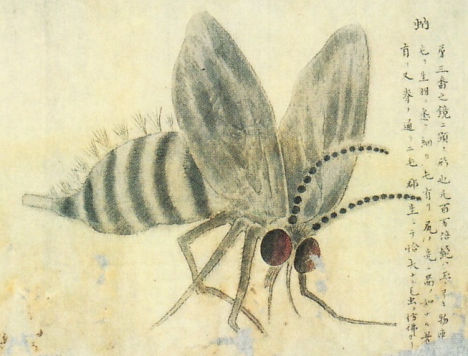
Gnat [+]
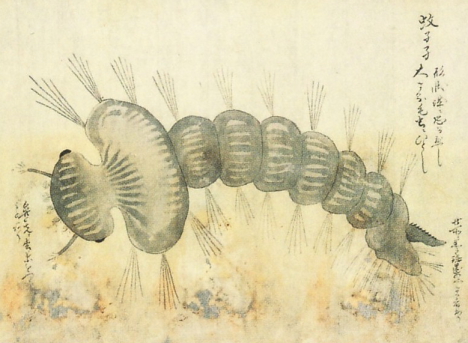
Mosquito larva [+]
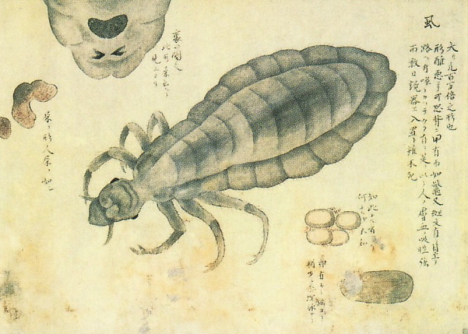
Louse [+]
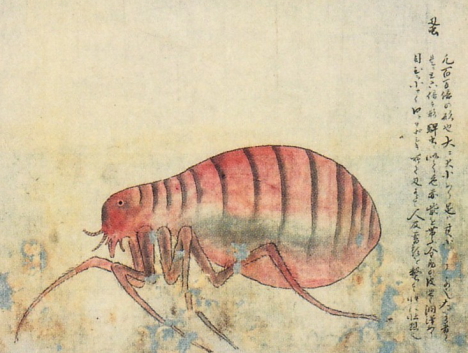
Flea [+]
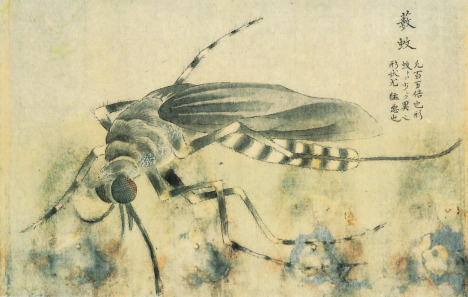
Striped mosquito [+]
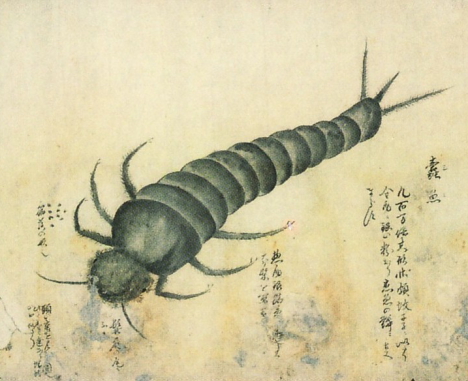
Silverfish [+]
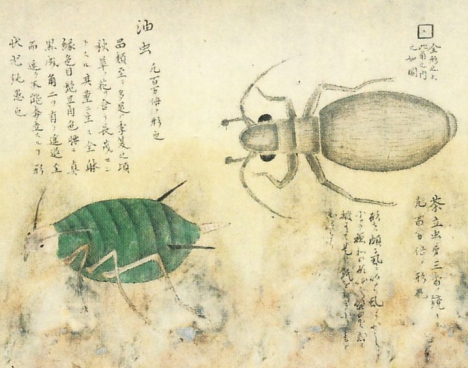
Aphid (left), Psocid (right) [+]
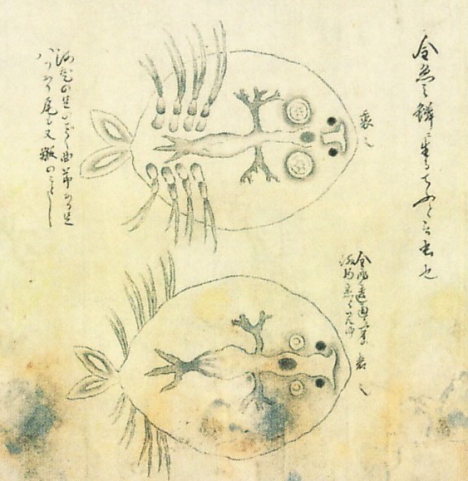
Fish louse [+]
The first microscope was brought to Japan in the mid-18th century (about 150 years after its invention in Europe) by Dutch traders at Nagasaki, and it was introduced to the public by pharmacologist Rishun Goto in a 1765 book entitled Oranda-banashi ("Story of Things Dutch"). Soon afterward, production of the first Japanese microscopes began in Osaka.
In 1787, Churyo Morishima, a scholar of Western science, published Komo Zatsuwa ("Sayings of the Dutch"), which described the lifestyle and customs of the Dutch in Japan. The document included a section devoted to the microscope, complete with illustrations of insects as seen through the device.
As Japanese microscope technology developed, the device became a popular attraction at carnival sideshows. One notable sideshow in Nagoya in 1820 put an assortment of fleas, lice, mosquitoes and other bugs on public display. According to written records of the event, many spectators shuddered with fear as they peered through the microscopes, which made the creatures look as large as a human hand. Others viewed the microscopes with excitement, as they offered a glimpse into a previously unknown world.
The Tohoku University Library houses the original copy of the Kenbikyo Mushi No Zu scroll.
[See also: Mythical 16th-century disease critters]
Takeuchi Taijin's "A wolf loves pork" is a mind-boggling stop-motion animation piece created from hundreds, if not thousands, of printed photographs that traverse the walls and furniture of a one-room apartment.
[Link: A wolf loves pork.]